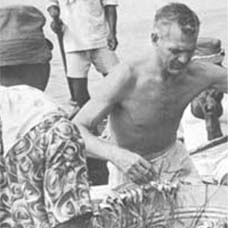
Kennedy in his short time as president went on to make a strong pitch for ardent citizenship at home and democracy around the world, among other deeds proclaiming himself a "Berliner" and creating perhaps America's best ambassadors through the Peace Corps.
As JFK did before him, Bush must reach out
e-mail print
Thursday, December 23, 2004
By BOB SOMMER
JUST BEFORE Election Day in his 1960 campaign for the presidency, John F. Kennedy stopped at the Bergen Mall in Paramus and declared, "I don't run... in these dangerous days saying that if I am elected life will be easy and the problems all solved, because I think to be an American in the next decade is to bear heavy responsibilities and great burdens."
Kennedy in his short time as president went on to make a strong pitch for ardent citizenship at home and democracy around the world, among other deeds proclaiming himself a "Berliner" and creating perhaps America's best ambassadors through the Peace Corps. To this day, many nations have at least a park, boulevard or building named after him.
While President Bush might make a similar declaration next month during his second inaugural address, it seems highly unlikely he will be cheered around the word, and be honored by having public edifices named after him. Indeed, his reputation, and that of America, has deteriorated to such a point that at a summit meeting with Arab leaders this month Secretary of State Colin Powell was unable to introduce any political initiatives to encourage democratic change in the region for fear of instant rejection.
What's gone wrong? For much of the nation's history, Americans have believed what the author of "Common Sense," Thomas Paine, said during the Revolutionary War: "The cause of America is the cause of all mankind." And Bush would like it to be so today. But it isn't, as his post-Sept. 11 policies regarding terrorism and the Iraq war have isolated America from most friends and foes alike worldwide.
In the case of the Bush administration, actions have spoken far louder than words, and the president has been quite ineffective in rallying support from most other nations for his programs. In fact, his two most recent trips abroad to Canada and Chile were met with near riots in the streets. Unlike international visits by Kennedy during his presidency, neither of the two nations' leaders proclaimed a Bush Plaza or Bush Boulevard.
At least the president seems to recognize the problems the United States faces abroad, and he has pledged that his second term will be an "important opportunity to reach out to our friends." Perhaps in his second inaugural address next month, Bush will attempt to reestablish America's respect and support around the world.
But it won't be easy.
He needs to convince more Americans the path he has set for the nation is the right one before he can persuade the world he is leading in the correct direction. Yet Bush has asked little of his fellow countrymen and women - other than the tens of thousands of soldiers serving under extremely difficult circumstances in Iraq and Afghanistan. And the world has taken notice. Being a nation's leader and being a leading nation involve not just power, not just wealth, but sacrifice as well.
Kennedy made it clear, "... ask what you can do for your country." Bush hasn't come close.
Interestingly, Kennedy's visit to Paramus that day in 1960 coincided with Citizenship Day. The Record editorialized the same day: "The proper evaluation of every citizen is based on what he contributes to our vast co-partnership, not what he takes out of it," presaging Kennedy's immortal inaugural address just four months later.
Bush needs to take the challenge made by Kennedy and renew the call to Americans to help make the United States and the world a better place. Second terms can be important ones, especially regarding international affairs, despite the typically negative view that little gets done by a lame-duck administration. Indeed, two presidents, Theodore Roosevelt and Woodrow Wilson, won the Nobel Peace Prize after being reelected.
It would serve Bush well to examine Kennedy's words at the Bergen Mall. He quoted Benjamin Franklin at the close of the Constitutional Convention saying, "We have made our judgment. It is a rising sun and the beginning of a great new day."
Then, Kennedy concluded by saying, "I think in 1960 it can be for the United States and the Free World a rising sun and the beginning of a great new day." After becoming president, Kennedy put those words to action, defining a generation.
President Bush now has the same opportunity. Hopefully, in a second term, he realizes his words about freedom mean little abroad when America is viewed so negatively. There was a time not too long ago when American flags were hung in windows throughout Europe as a sign of freedom and hope. Today, as a direct result of the president's actions, the American flag is ridiculed by far too many throughout the world.
This must change, and it is up to Bush to lead the country to a better place. He can't just want it to happen but must inspire Americans to give instead of simply expecting to receive. Only then can he restore America's reputation abroad and again make the American flag the symbol of freedom it should be worldwide.
Bob Sommer, a Ridgewood resident, is executive Vice President of MWW Group and lecturer at the Bloustein School of Public Policy at Rutgers University. Send comments about this column to oped@northjersey.com.









